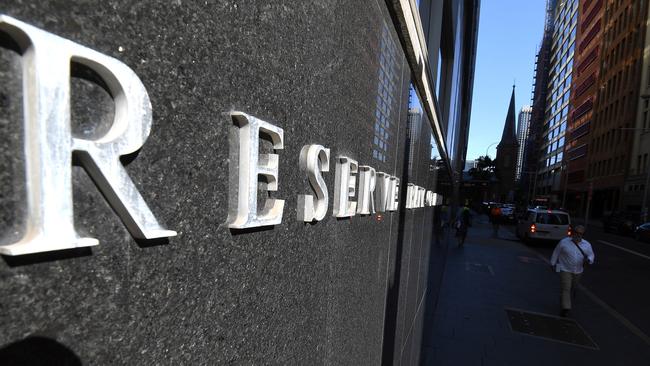Banks, businesess facing elevated Covid risks: RBA Stability Review
Australia should brace for an additional 5200 businesses failing relative to good times, the RBA says.

Australia should brace for an additional 5200 businesses failing relative to a ‘normal’ year assuming there is no rapid recovery in the economy from the coronavirus pandemic, according to the Reserve Bank.
Even so, the number of business failures remain at a historic low and the rate of collapses would have been far high without government support measures put in place since March including the $100bn JobKeeper wage subsidy program, the RBA said in its biannual Financial Stability Review.
The central bank was relatively sanguine in its assessment of the financial system despite the savage hit from the coronavirus, concluding the nation’s banks and financial markets were up to the task of supporting the economic recovery.
Defaults could rise as mortgage deferrals and government income support for workers and firms ends in coming months, the central bank said.
However while acknowledging “risks are elevated” the Council of Financial Regulators, of which the RBA is a member, maintains that “the Australian financial system is in a strong position”.
Risks would be “exacerbated by a weaker-than-expected economic recovery”, for example stemming from further setbacks on the health front or international political tensions, the RBA cautions.
However, stress tests show the banks would remain above their minimum capital requirements even if the economic contraction is substantially more severe than expected.
“Given their strong balance sheets, banks will be well placed to continue lending, supporting the economic recovery and so in turn the Australian financial system,” the RBA says.
Amid large fiscal stimulus payments, loan repayment deferrals and the early release of funds from superannuation, household finances have been cushioned from the impact of the pandemic by support measures, with overall household income rising and savings surging despite the sharp decline in output and falling employment in the first half of the year.
Households have used this boost to increase savings – including via larger payments into mortgage offset and redraw accounts - in response to higher economic uncertainty.
“However, with unemployment having increased and many employees working reduced hours, the share of households experiencing financial stress has increased and will increase further,” it says.
Still, while some households are “struggling”, the “finances of most households are faring well” to date and “demand for housing has held up”, according to the RBA.
On that front it notes that there have been only small falls in housing prices in Sydney and Melbourne, although those falls have been larger in inner city areas.
The stability review also found that Australian businesses generally had low levels of debt going into the crisis and income support measures, rent relief and loan repayment deferrals have helped maintain cash flow despite the sharp reduction in revenue experienced by many businesses.
Support measures, in conjunction with temporary insolvency relief, have seen increased cash buffers and lower rates of business failures this year, and the continued availability of equity and debt funding has enabled large businesses to shore-up their balance sheets.
But “business failures will rise substantially when loan repayment deferrals and income support come to an end” with “flow-on effects to their creditors, both financial institutions and other businesses, and their employees”, the RBA warns.
Some commercial real estate also poses “significant risks for lenders and leveraged investors.”
It notes that the pandemic has accelerated structural change that has pushed up retail property vacancy rates and hit valuations.
“Conditions in office markets had been tight prior to the crisis, but with the economic downturn and changing expectations of future office use, conditions have deteriorated,” it says.
Meanwhile RBA figures show the introduction of the $100bn JobKeeper program is estimated to have reduced business failures by around 4600 firms in financial year 2020.
Assuming that JobKeeper and other policy stimulus is tapered in line with current announcements, a further 6600 firms are estimated to be saved in financial 2021, relative to no policy response, the RBA says in the stability review.
Even in good times typically between 15,000 and 20,000 firms fail each year, the RBA noted.
“The decline in revenue to date would have been larger in the absence of the policy response, and so likely understates the effect of the COVID-19 pandemic,” the Reserve Bank said.
The central bank said firms in the accommodation and food services, arts and recreation services, and other services industries were proportionally more likely to receive the JobKeeper wage subsidy.




To join the conversation, please log in. Don't have an account? Register
Join the conversation, you are commenting as Logout